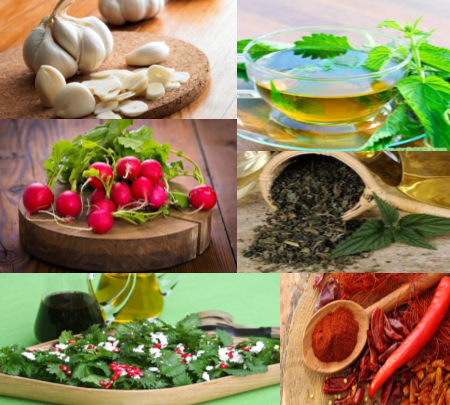There are many herbs that help with a cold. And not only herbs, but there are also vegetables, blossoms and all kinds of plants that have a positive effect on a cold. We have collected a number of tips.
Red pepper for colds
We already know that red pepper can help with cold complaints, such as a stuffy or runny nose. Of course our Capsinol nasal spray has been developed for that. It has also been scientifically proven that the hot substance in the red pepper (capsaicin) has a positive effect on chronic nasal complaints. You notice it yourself when you eat that spicy food can get your nose running. For long-lasting results, it is important that the pepper is brought in via a nasal spray. Hot food alone will not solve the problem.
Onion for colds
Put a sliced onion next to your bed before going to sleep. It is a well-known cold remedy. And it really works! Also eat raw or seared onion regularly. It is very healthy and helps to build up resistance. You can also steam and eat a red onion (in this case, the red onion is better than the white onion)
Radish for colds
That radish can help for your health is still relatively unknown to many people. Eating radish can help with colds. The excess mucus is dissolved and reduced, and the antibacterial effect reduces irritation on sinuses.
Garlic for colds
The antibacterial effect of garlic is very helpful against a starting cold or flu. Process the garlic in your food, smoothie or as a snack. The latter may not be very obvious, if you eat it raw, you can counteract the odor that leaves your mouth by chewing parsley. Garlic is also good for your cholesterol, in short 2 birds with one stone.
Thyme for colds
A tasty thyme tea against stuck mucus, coughing and tightness. You can of course also use the thyme in your food. A purely natural antibiotic that can be processed in many ways. Also shown by scientific research.
Nettle for colds
You can use nettle for a natural cleansing of the body. The versatile banded nettle strengthens the immune system and is therefore very suitable for a starting cold. It is also a cheap means. You can make tea with it, a spoonful of honey in it is recommended. To give an idea of what the nettle contains: vitamins A, B, D, C, K, iron, carotene, calcium, potassium.
Purple coneflower for colds
The purple coneflower (also called Echinacea) is used to make drops and tea. With a starting cold / flu, the tea is recommended, if you are in the middle of the flu, it is better to use the drops for a stronger approach. The purple coneflower can not only help against the flu, it can also have a relieving effect against hay fever.
Four flowers against colds
You can make a tea from dried four-blossoms, soak the leaves in boiled water. The elderflower is anti-inflammatory and helps the body to perspire extra, so that the body temperature can drop if you have a fever.
Den against colds
Young pine shoots of the Pinus sylvestris are ideal for dealing with colds, coughs, gout and rheumatism. This tea is also a valuable remedy for coughing. This ingredient is usually also in cough syrup.
Blackberries for colds
Blackberries are very good for colds. Due to the high amount of vitamin C and antioxidants, the blackberry is very good for your resistance. The nice thing about the blackberry is that you can add it in all kinds of dishes: smoothie, in yogurt, in a salad, juice, tea or as a ‘snack’. Blackberries can be picked yourself from mid-August to September.
Cranberry for colds
It is well known that cranberry juice can help against a bladder infection, did you know that it also helps against a cold? Cranberries have a mild antibacterial effect that helps against a cold. A glass of cranberry juice every day would help. Do you want to pick them fresh? This is possible from August to October, depending on the type. Once picked, they can be kept in the refrigerator for about 2 months.
Linde for a cold
Linden tea helps the body to secrete toxins through the sweat glands and urinary tract. Mix a handful of lime blossoms with some fresh orange juice, lemon juice and honey.
Meadowsweet (Filipendula ulmaria) for colds
The leaves, roots and flowers are dried and used. The infusion of the plant is used to treat the common cold and rheumatism.
Do you also suffer from an annoying cough?
Make yourself a tasty herbal tea to ease the complaints.
– To loosen: tea from crushed or ground fennel seeds
– For tough mucus: ginger tea + ground fennel seeds or thyme
– Expectorant and disinfectant: thyme tea
– Ticklish cough: liquorice tea
– Persistent cough: thyme tea (12g) + wild chamomile (25g) + pinch of cinnamon and ginger powder and possibly honey


